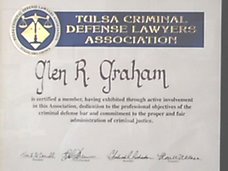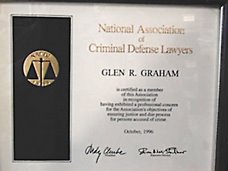More General Information about Domestic Violence Cases
by Glen R. Graham, Attorney at Law
See other post about subject matter herein below this post at:
More information about Tulsa Domestic Assault and Battery Criminal Offense
Victim's or Witness Request to Dismiss and Affidavit: (Google Docs)
http://docs.google.com/Doc?id=dhmqv6sp_0c4pxcddz -
You can print this off and give it to your lawyer (not the prosecutor) to give to the prosecutor at the proper time. It is not binding on the government but it does give the assigned prosecutor something in his file from the accuser. If the prosecutor has it too soon, they may attempt to force the witness to testify involuntarily so you may want to discuss this with your lawyer before subjecting yourself to persecution by the prosecutor.
Domestic violence assault and battery cases are viewed as extremely serious cases where the violence may escalate or where people may be injured or children psychologically injured.
There is political pressure to pursue all domestic violence cases because there is a belief that the violence may escalate or that people's lives or safety may be endangered.
Alleged "victims" may want to legitimately dismiss the charges but the criminal case is being prosecuted by the State and not the victim. The prosecutor may initially refuse to dismiss the case in order to extract a "plea" from the defendant which will require counseling which is usually once per week for fifty-two (52) weeks under the current statutory laws passed by the Oklahoma legislature. This blanket law ignores the individual differences between individuals and between the individual circumstances of the specific case. Upon conviction, it requires 52 weeks of counseling simply because it is a domestic violence assault and battery case.
The case may get dismissed anyway if the state is unable to prove the case if there is no witness that testifies after the case is set for trial unless the state can prove the case with other evidence.
Without a witness, the state will attempt to use the following:
1. Admissions and confessions by the defendant;
2. Photographs of the injuries;
3. 911-tape of the call reporting the incident;
4. Statements that fall within the exception under the Crawford analysis. The Crawford case held that a defendant has a right to confrontation but not as to statements that were not "testimonial" in nature. So, 911-tapes are considered non-testimonial and are admissible as an exception to the Crawford rule;
5. Other witnesses.
Many times the other evidence is not sufficient and the case may get dismissed at the time of trial without sufficient evidence.
Most prosecutors will attempt to telephone the "victim" at the phone number in the police report. Some prosecutors may attempt to bluff the victim into changing their mind about pursuing the case. It is not right to lie or intimidate a witness. However, prosecutors generally do not get prosecuted by other prosecutors. So, I have heard of cases where a prosecutor would threaten to have the "victim" arrested if she did not appear in court. However, the statute dealing with material witness warrants states that a victim cannot be arrested on a material witness warrant. A smart victim would not talk to a prosecutor who might prosecute them for any statements which they might make indicating they were not truthful when they filed a police report or indicating that they have changed their mind about what happened. Some prosecutors will threaten to take the children away if the victim does not co-operate. A prosecutor cannot "take the children away" because the victim refuses to co-operate. A prosecutor can request a DHS investigation but this does not mean that the children are automatically taken away. Most DHS investigations are performed by an "independent" DHS case worker and their reports will be reviewed by an independent Judge. Unfair statements by prosecutors designed to intimidate or coerce victims into pursuing a case which should be dismissed are not ethical. Prosecutors generally will not prosecute other prosecutors.
Attorneys are supposed to be bound by a Code of Professional Responsibility which is supposed to apply to all attorneys even prosecutors.
More General Information About Domestic Violence Cases
Subscribe to:
Post Comments (Atom)






1 comment:
Victims of domestic violence are routinely jailed for failure to respond to material witness warrants issued by the Clark County (NV) prosecutors. Makes you wonder if the only victim they can identify is of the chalk outline variety.
Post a Comment